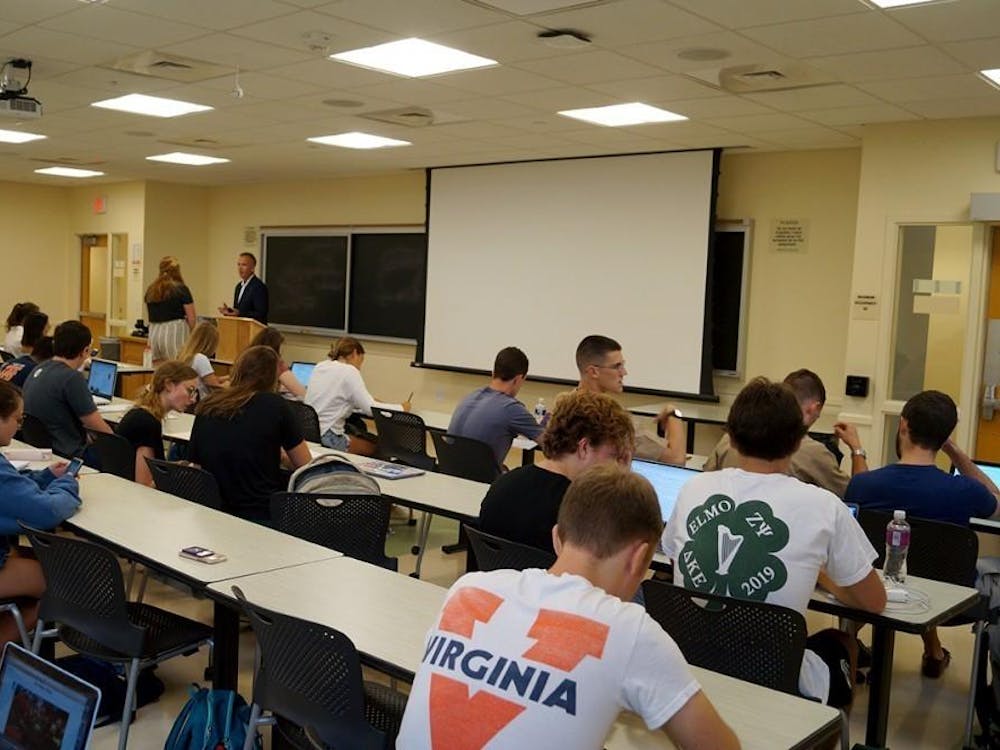TO SAY that the University's honor system has flaws is a major understatement. From troubles with the definition of "seriousness" and "non-trivial" to problems reporting intent to commit an honor offense, a guilty verdict at the honor court is an arduous and subjective process for the Honor Committee. What is not subjective, however, is the punishment for committing an honor offense -- expulsion from the University. The single sanction's flaws are as evident as ever in the case of Steve Gilday; if this policy is ever to change, students need to voice their disapproval with recent events now.
The single sanction reared its ugly head last week when Steve Gilday, a third year Engineering student, was forced to leave the University under ambiguous circumstances. While there were many factors playing a role in that case, the overall circumstances that led to his expulsion were much more difficult to discern. Gilday filed intent to appeal last week, something that he is unlikely to be granted since the appeal will likely be for inconsistencies within the trial.
Cases such as Gilday's add to the problems of the single sanction. The single sanction allows students who have committed an honor offense to go free, since other students are less willing to report offenders. Those who are convicted, however, receive the same punishment even if there is a significant difference in the crimes and reactions of different students. According to a recent report by the ad hoc Committee on the Investigation of Single Sanction, 27 percent of jurors who voted "not guilty" in not guilty trials would have voted guilty had there been alternatives to the single sanction. While that is a decrease from previous years, the fact still remains that one-fourth of all jurors are not voting on the actual facts of the case.
The single sanction also reduces the number of students reporting an honor offense if it occurs. The study found that 27 percent of fourth year students would be unlikely to or would not report a case.
While the study did conclude a split between 43 percent supporting and 37 percent opposing the current single sanction system, many students are increasingly growing skeptical of the single sanction. Additionally, students automatically come to the University hearing a case more for the single sanction than they do for alternative proposals.
If the sanction were no longer in place at the University, what are the alternatives for the honor system? The group Hoos Against Single Sanction is discussinga multiple sanction system. In an interview with Sam Leven, the communications director for the group, a multiple sanction system would be similar to the sanctioning system used by the University Judiciary Committee. This new system would mete out different punishments depending on the severity of the honor offense and other extenuating factors. While details on this possible alternative are still being discussed, not only will students be more willing to report actual honor offenses, but once a reported student is convicted of an honor offense, the honor court will make sure that the resulting punishment fits the crime.
Students can remain active to ensure that future cases do not end up like Gilday's. For instance, supporters of new multiple sanction campaigns could rally under the banner of Gilday's cause. Furthermore, students are already voicing their dissent regarding the outcome of the trial through petitioning and public disapproval.
Just because the single sanction has a long history does not make it any more justified. Generations of honor policy does not mean that the current honor system is flawless, it just means that the honor system has been flawed for a long time. According to the Free Lance-Star, a Fredericksburg newspaper, Harvard, Yale and Columbia have simply given up on the concept of honor codes since they did not significantly reduce honor offenses in their respective colleges. Even the Alumni Association Magazine has claimed that students are less willing to hold each other accountable, forcing professors to step in instead. While the honor system does not need to disappear at the University, it does need serious reform, and eliminating the single sanction is the first step. Students such as Gilday deserve better.
Adam Silverberg's column appears Thursdays in The Cavalier Daily. He can be reached at asilverberg@cavalierdaily.com.






